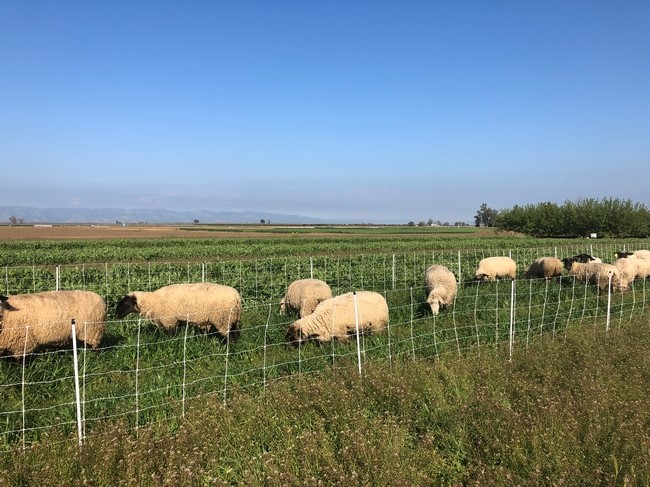Project explores livestock grazing impacts on organic crops
Multi-state study to examine food pathogen persistence and survival in soil and transfer to vegetable crops.
May 22, 2020

Livestock grazing could be beneficial for organic farming systems, so to see if the practice poses any food safety risks, university, government and nonprofit partners will receive a nearly $1 million grant from the U.S. Department of Agriculture's Specialty Crop Multistate Program to study the impacts of livestock grazing of cover crops on bacterial population dynamics, soil building and environmental health.
“Fresh produce growers and their advisors will benefit from learning about the impacts of integrating livestock grazing with winter cover crop management on soil health, including soil organic matter, nutrient cycling and reduced nitrate leaching and potential food safety risks discovered in this project to make decisions on adoption, management and environmental benefits of winter cover crop management in annual vegetable systems,” said Alda Pires, University of California Cooperative Extension specialist in the University of California-Davis (UC-Davis) School of Veterinary Medicine and principle investigator in the study.
The $999,985 project, “Evaluating the Food Safety Impacts of Cover-Crop Grazing in Fresh Produce Systems to Improve Cover Crop Adoption, Crop-Livestock Integration & Soil Health,” is being led by the University of California in partnership with The Organic Center, USDA's Agricultural Research Service (ARS), the University of Maryland Eastern Shore, the University of Minnesota and the California Department of Food & Agriculture.
Livestock grazing of cover crops could be beneficial for organic systems because it maximizes the strengths of cover cropping, including enhanced soil fertility, structure, water infiltration and storage and reduced nitrate leaching while addressing challenges that have limited the expansion of cover crop use, UC-Davis said. These challenges include concerns over cover crop water use and nutrient immobilization, which could result in nutrient deficiencies and increase input costs for the crops that follow.
Many growers consider livestock grazing of cover-cropped fields in fresh produce operations as a way to enhance soil health and environmental benefits by increasing carbon inputs and nutrient cycling.
“This study will allow farmers to complement the benefits of both cover cropping and livestock integration into cropping systems,” said Jessica Shade, director of science programs at The Organic Center. “Like cover cropping, integrating animals into cropping systems can be beneficial to farm environmental impacts and profitability by improving nutrient cycling, reducing dependence on external inputs, improving soil health and diversifying profit streams.”
Despite the well-known benefits of animal/crop integration, concerns over microbial food safety are limiting the expansion of animal integration into cropping systems, the announcement said. Recent research has shown that integrated crop/animal systems perform well in keeping pathogens out of meat, but additional research is needed to examine the synergistic impacts of the use of livestock for cover crop grazing on ecosystem health and food safety, the researchers said.
UC-Davis said this project will fill this research need by examining food pathogen persistence and survival in soil and transfer to vegetable crops and the relationship between soil health properties, environmental factors and pathogen survival in grazed cover crop-vegetable production in three states.
The researchers will graze sheep in cover-cropped fields before planting spinach and cucumber. They will measure changes in soil health indicators over two years of grazed cover crop-vegetable production and assess benefits and potential trade-offs of vegetable cash crop productivity. The results will be compared to vegetable fields planted in tilled cover crops and a fallow field.
Pires' research team is multi-institutional, multi-regional and interdisciplinary, including: Michele Jay-Russell, UC-Davis Western Center for Food Safety; Nicole Tautges, UC-Davis Agricultural Sustainability Institute; Amelie Gaudin, UC-Davis; Patricia Millner, ARS; Fawzy Hashem, University of Maryland-Eastern Shore; Paulo Pagliari, University of Minnesota, and Jessica Shade, The Organic Center.
The Organic Center will lead outreach efforts focusing on the benefits of grazing and food safety impacts such as online tools, outreach events, conference presentations and publications targeted to growers, policy-makers and consumers.
You May Also Like



